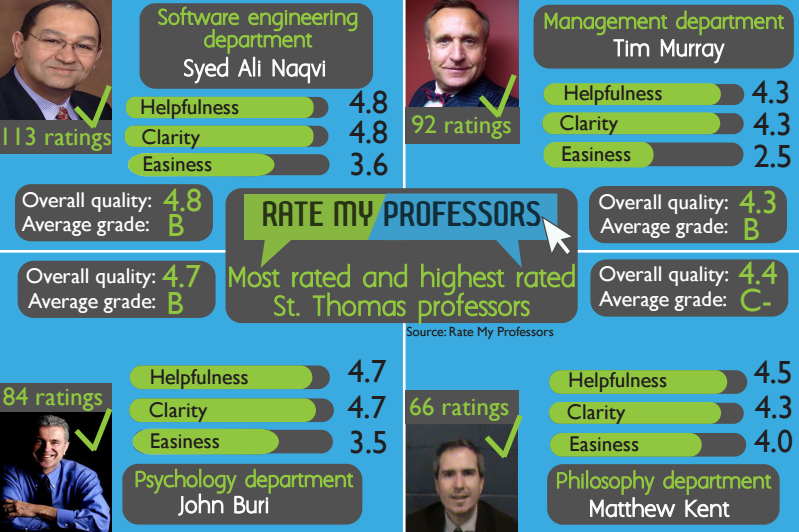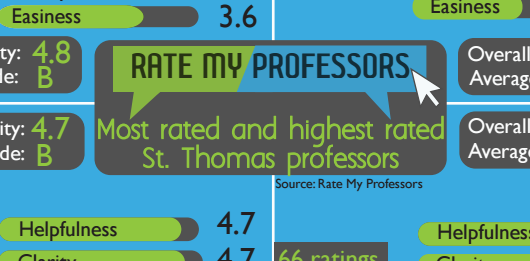
Professors John Buri, Syed Ali Naqvi, Matthew Kent and Tim Murray are four of the top-rated professors at St. Thomas, according to the popular website, Rate My Professors. Whether they regularly check their profiles or have never even looked at them, all four care about student feedback and strive to improve.
John Buri: 4.7 with 84 ratings
Psychology professor John Buri has been teaching at St. Thomas for more than 30 years but has never looked himself up on Rate My Professors. He values student feedback but said he prefers end-of-semester course evaluations over the website.
“The course evals are very specific to that particular course, so I can glean insights as to what worked and what didn’t work,” Buri said.
For instance, Buri is now revamping an upper-level psychology lab because he heard from students it was too similar to his popular psychology of marriage and family class. The comments came in the course evaluations over several semesters.
“One (criticism) probably doesn’t justify it, but I will seriously look at that,” Buri said. “If two or three say it, then it’s probably something I need to really look at.”
Buri reads every evaluation because he wants to make sure his material is relevant to his students’ lives.
“I value that feedback because these are the people that I want to understand and I want to be available to,” he said. “When I no longer learn from my students, then it’s time for me to quit.”
Syed Ali Naqvi: 4.8 with 113 ratings
Professor Naqvi teaches software process and project management in the St. Thomas graduate school and constantly improves his teaching style based on student feedback.
“In fact, for the last 10 years, that is what I have been doing – listening to the students, what is working for them,” Naqvi said.
Naqvi regularly checks Rate My Professors for student criticisms and tries to implement those changes in his classes. He said he likes to combine those comments with course evaluations to improve his classes because together they provide a more complete picture.
“Students a lot of times do not give detail,” he said, referring to the required end-of-semester course evaluations. “They just mark the numbers, and that’s about it … Those (Rate My Professors) comments complement what the evaluations at school do for me.”
Naqvi isn’t worried that professor evaluations sometimes seem like popularity contests, with students who got good grades rating their professor highly.
“If you work hard – if the student is willing to work hard – I am willing to work with them and grades then automatically become good grades,” Naqvi said.
Matthew Kent: 4.4 with 66 ratings
Adjunct philosophy professor Matthew Kent places more weight on end-of-semester course evaluations and in-class feedback than what his Rate My Professors ratings might say.
He said he believes there is a disconnect between students who take the course and students who go on the website.
“Every student who takes the class is handed a course evaluation, so they all are given an opportunity to say whatever they want … but when it comes to Rate My Professors, I guess it’s not quite as thorough of a sampling,” Kent said. “It’s whoever bothered to go to that website and type something up.”
Still, Kent takes his criticisms seriously and tries to implement changes in his classes as soon as possible. He said he can tell when students aren’t understanding a topic from how they behave in class and during test review sessions.
“These review sessions are actually as helpful to me as they are to the students,” he said, explaining that he gets ideas to improve his classes as he’s teaching them. He also said he likes to ask, as a final question on tests, what topic students most enjoyed from that unit so he makes sure not to drop it from the syllabus.
Kent said he trusts what students say about his teaching style from evaluations but prefers the instant feedback of the classroom.
“What goes on in the classroom I find to be maybe even more reliable, more helpful,” Kent said.
Tim Murray: 4.2 with 93 ratings
Management professor Tim Murray encourages his students to go on Rate My Professors and write whatever they think about him.
“If the institutional mechanisms don’t allow you to point out mediocrity or poor quality, then a unconstrained social media tool like Rate My Professors is an excellent mechanism to make sure the truth gets out,” Murray said.
Murray has changed classes in the past based on student feedback because he said believes that students know a good professor when they see one. His ultimate goal is not, however, high ratings.
“My goal is to pay it forward with these students because the most influential people in my life have been teachers … This is my chance to pay it forward, and if students happen to like that, that’s great,” Murray said.
Although Murray does look at end-of-semester course evaluations, he said he prefers the unconstrained nature of professor rating websites. He said students sometimes perceive themselves as having no power and sites like Rate My Professors disprove that.
“The reality is that social media and the Internet provides a platform for individuals without power to band together and to exert power for positive change,” he said. “And I just can’t wait to see what your generation is going to do with that.”
Elena Neuzil can be reached at neuz3833@stthomas.edu.

